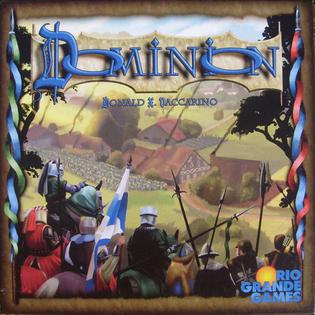In this Medieval-themed card game, two to four players compete to amass the most property in the kingdom. From an initial deal of five coin and three property cards, players build their decks by amassing action cards as well as additional coin and property, each with a different value. Action cards may do anything from grant the player more coin to penalize an opponent. When an end condition is reached (typically, all the highest-value property cards have been drawn), the property is totaled and a winner is declared.
The appeal of Dominion lies in its flexibility. There are more than a dozen different action cards, and they can be mixed and matched to build a custom game every time. Through trial and error, it is easy to eliminate any cards you don’t like (I’m looking at you, Adventurer) and focus on those that make the game the most interesting.
In addition, Dominion forces players to think strategically. If your opponents are buying Thief (costs you coin) and Witch (costs you property value via “curse” cards) cards, you’d better stock up on Moats (defends against attack cards). If property is disappearing fast, you’d be wise to grab what you can, even if it’s a paltry Estate. Not only does this forced adaptability increase player involvement in the game, but it deemphasizes luck. You don’t like the hand you drew? Guess what, you bought the cards.
Like all games, there is a bit of a learning curve. Dominion’s multi-phase (one action and one buy) turns take some getting used to, and the relative lack of warfare (Militia cards aside) may make the game seem boring to newcomers. Once you adjust, however, it becomes both easy and engrossing. Each configuration of cards and group of opponents bring new challenges. There are also expansion packs to increase the possibilities.
8/10

No comments:
Post a Comment